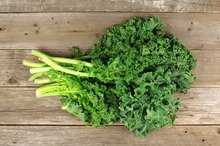What Vitamins Do Mangoes Have?
Mangoes are grown in tropical climates. In the U.S., mangoes can be found in the grocery store throughout the year because shipments come in from a number of different countries in South America and the Caribbean, according to the National Mango Board. A 1-cup serving of mango contains about 100 calories and some vitamin C, calcium, vitamin E and vitamin A.
Vitamin C
Vitamin C is an essential vitamin for humans, according to the Office of Dietary Supplements. It is a water-soluble vitamin and must be consumed regularly because it is not stored in the body. Vitamin C is needed for normal growth and development and for the synthesis of collagen, a protein found in skin, tendons and ligaments. Vitamin C is also an important antioxidant protecting cells from free radical damage. As an antioxidant, vitamin C may help protect against cardiovascular disease and cancer, according to the Office of Dietary Supplements. Adult men need 90 mg of vitamin C a day and adult women need 75 mg. A 1-cup serving of mango provides 45 mg.
Folate
Does Vitamin B12 Make You Lose Weight?
Learn More
Mangoes also contain folate, or vitamin B-9. This vitamin plays an important role in helping your body produce proteins and DNA -- the building blocks of newborn cells. For this reason, getting enough folate is especially important for expectant mothers, because they need to meet the needs of the developing baby's rapidly-dividing cells. A cup of mango provides 71 micrograms of folate, or 18 percent of the folate you need each day.
Vitamin E
Vitamin E is a fat-soluble vitamin. It helps immune function and is an important antioxidant. Most Americans do not get enough vitamin E in their diet, according to the Office of Dietary Supplements. Adults need 15 mg of vitamin E a day. A 1-cup serving of mango provides 1.85 mg.
Vitamin A
Vitamins in Leafy Greens
Learn More
Vitamin A is important for vision, bone growth and reproduction. It also plays a role in cell division and differentiation, according to the Office of Dietary Supplements. Vitamin A deficiencies are rarely seen in the United States, but poor vitamin A intakes can lead to night blindness and a decreased ability to fight infections. Mangoes are an excellent source of vitamin A, according to the National Mango Board. A 1-cup serving of mango provides 63 mcg RAE, or Retinol Active Equivalents accounting for the biologically active vitamin A as a retinol or a carotenoid. Adult men need 900 mcg RAE of vitamin A per day and adult women need 700 mcg RAE.
Related Articles
References
Writer Bio
Jill Corleone is a registered dietitian and health coach who has been writing and lecturing on diet and health for more than 15 years. Her work has been featured on the Huffington Post, Diabetes Self-Management and in the book "Noninvasive Mechanical Ventilation," edited by John R. Bach, M.D. Corleone holds a Bachelor of Science in nutrition.









